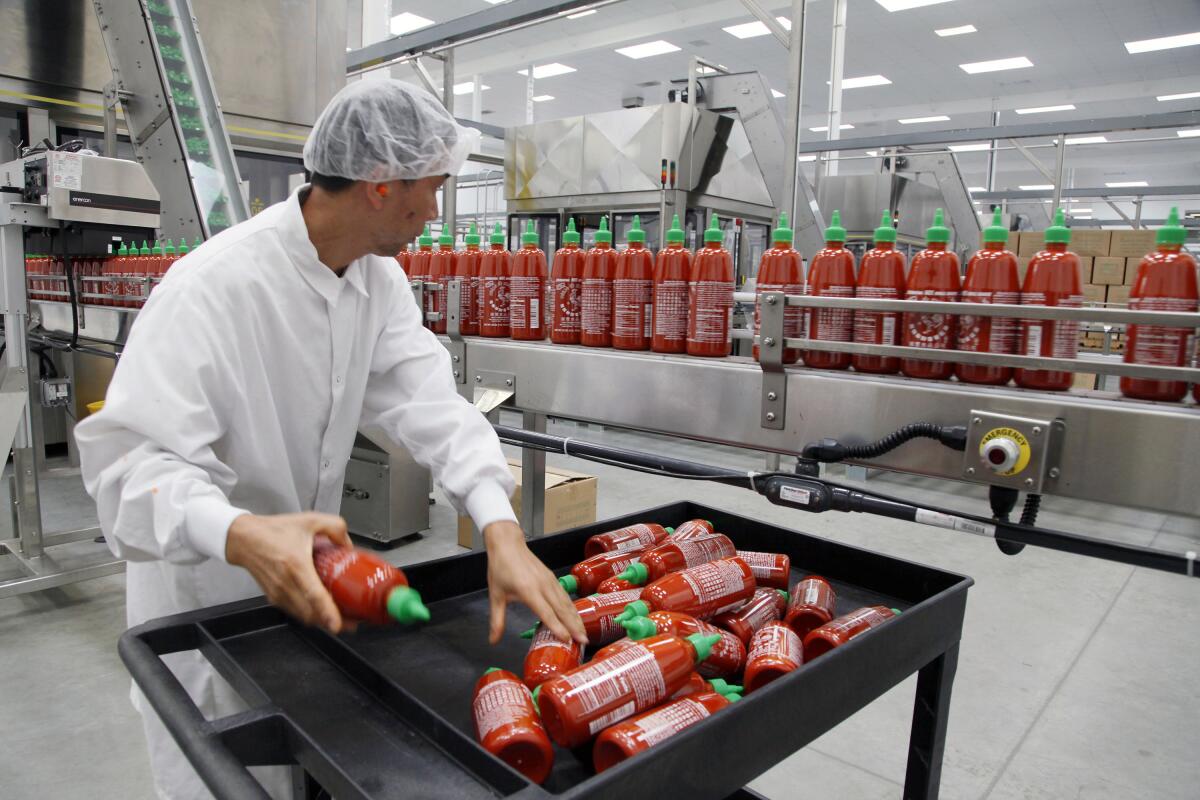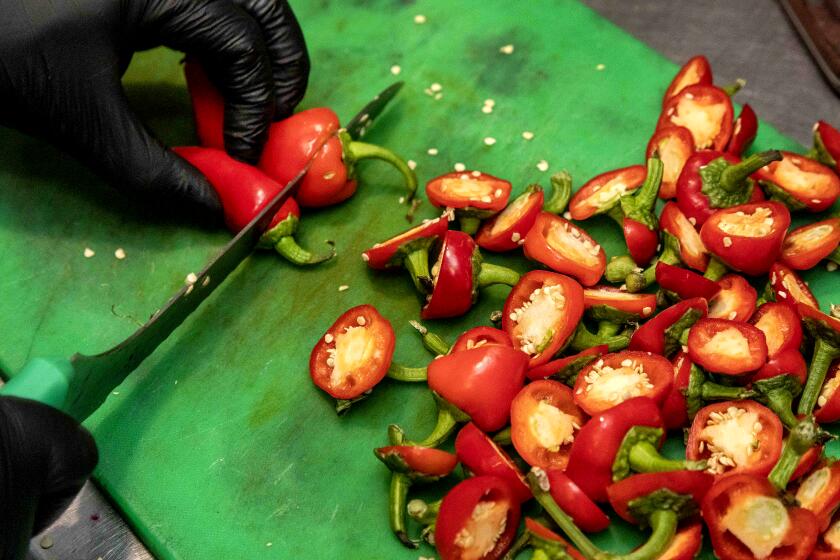Op-Ed: The Sriracha shortage, or as my wife might call it: Our long, heatless summer

We all have a very full platter this summer. A sinking economy. Scandalously high gas prices. An obstinate, and reemerging, coronavirus. War in a foreign land. Cryptocurrency collapse. And then there are the shortages. Tampons, baby formula and the one my wife brought to my attention — the Sriracha shortage.
My wife is Korean. She loves spicy. We even have a kimchi refrigerator in our garage. I do not search out spicy foods nor spicy condiments. I am from New England, where we used three spices — salt, pepper and maple syrup. Yes, maple syrup is a spice. It makes snow and oatmeal edible.
Sriracha is both a wonder spice and a condiment. I wonder how people can use it. My wife and hordes of others wonder how life can go on without it. A shortage of chile peppers has forced the Irwindale-based company that makes it to suspend production of a few sauces, including the wildly popular Sriracha Hot Chili Sauce.
The run on Sriracha was caused by weather in a single region of Mexico.
My wife recently heard an interview with the company’s founder, David Tran, whose Sriracha dominates the U.S. market. More than 10 million bottles of it are sold every year. He grew up in Vietnam and successfully sold a hot sauce there composed of vinegar, sugar, salt, garlic and red jalapeños.
But the original Sriracha sauce is actually Thai — and was created in the seaside city of Si Racha. Many residents of Thailand haven’t even heard of the U.S. brand.
Tran fled the Vietnam War on a ship named Huy Fong, which means “gathering prosperity.” After he arrived in the U.S. in the 1970s, Tran named his company after the vessel that rescued him and his sauce Sriracha, in honor of the place where it all began.
My wife never tells me things in this much detail. Later, she shoved the orange Sriracha bottle in my face and pointed at the name of the company on the label.
“See, it is right there. Huy Fong.”
“Yes, I see it!” I said.
“Do you know why there is a rooster on the label?”
“No.”
“Because David Tran was born in the year of the rooster.”
I now know there are 12 Asian zodiac signs that align with birth years. I was born in the year of the snake. My wife was born in the year of the dog. It may sound like horoscope hocus-pocus, but perhaps there’s something to it. My wife tells me couples who marry should never be a combination of dog and snake years. Some astrologer definitely got that right.
Later I said: “Well, I can live without hot sauce.”
“I can’t,” she said. “Hot sauce lovers need hot sauce. Hot sauce matters.”
“Really? How does it matter?”
“What about that fool on his first day in Korea and hot sauce? Or what about the bear in Alaska?”
The maker of a beloved condiment — Huy Fong Foods Inc. — has been forced to suspend production of its iconic spicy sauces due to a shortage of chili peppers.
The fool of course was me. On my first day in Korea I was ecstatic. Why? Because as I looked around I saw hundreds of street vendors squatting before vats filled with what I thought was yummy tomato sauce. I knew then that eating in Korea would be a joy. The only thing — all those vats weren’t filled with happy tomato sauce. They were practically radioactive spicy hot sauces and pastes with nearly the exact same ingredients as Sriracha.
The bear stars in a tale told by Korean friends who own a restaurant in Fairbanks. They said that in springtime the bears wake up desperately starving and often head to their restaurant on the edge of town. It was once filled with fishermen, oil workers and Indigenous people when a bear appeared at the front door.
The bear wanted in. He stood on his back legs and pushed on the thick glass door. The men inside knew if the bear broke through a massacre would follow. So they rushed the door. Six guys inside pushing out, a bear outside pushing in. But suddenly the bear stopped and ambled around the corner.
That super-hot spicy paste I had first seen in Korea apparently accompanies Koreans wherever they go. It’s often stored on staircases in 30-gallon ceramic vats. The bear smashed such a vat with one swipe, stuck his nose in for a yummy taste and surely wished he’d never woken up. He ran off howling to the amusement and relief of the many people inside. One local observer said slowly and deliberately: “Thought … I … might … have … to … shoot … the … poor … thing.”
My wife was quite happy with me reflecting on this. Especially the fool part.
I said: “It all makes sense.”
“Why?”
“The main ingredient in bear repellent is super-hot peppers.”
At any rate, the Sriracha shortage is allegedly ending in September. A certain bear in Alaska and I don’t really give a hoot. But armies of others will be counting the days.
Paul Karrer is a retired teacher in Monterey.
More to Read
A cure for the common opinion
Get thought-provoking perspectives with our weekly newsletter.
You may occasionally receive promotional content from the Los Angeles Times.












